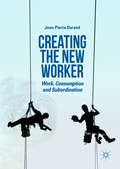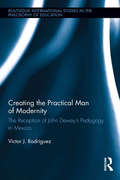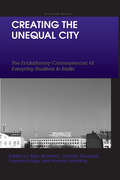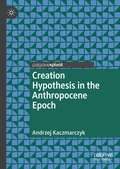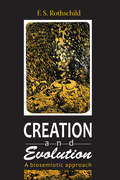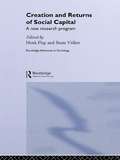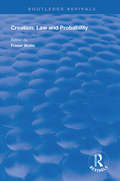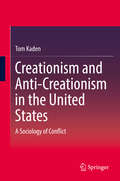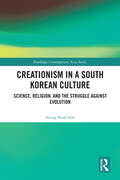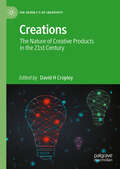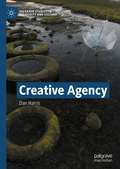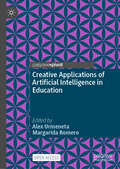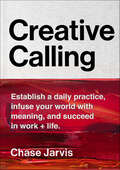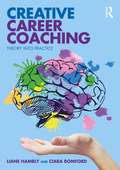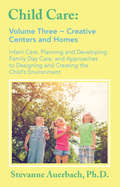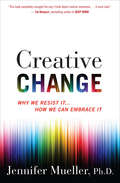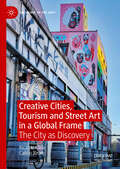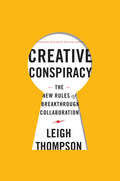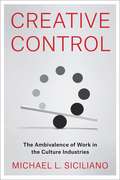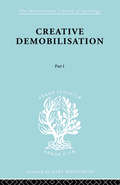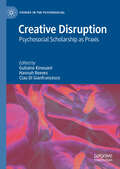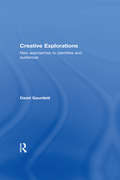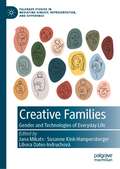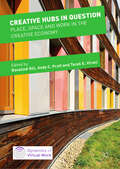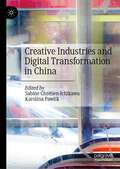- Table View
- List View
Creating the New Worker: Work, Consumption and Subordination
by Jean-Pierre DurandThis book explores the relationship between the changing nature of capitalism and the creation of the new worker. In a changing global economy, work - as the activity that structures individuals in capitalism both socially and psychologically - is being undermined. Combining a Gramscian critique of contemporary patterns of capitalist labour control with Lacanian psychoanalysis, Durand examines what kinds of human beings are emerging in and through modern work, or on its margins. Creating the New Worker will be of interest to students and scholars who engage in the sociology and psychology of work, economics, and labour.
Creating the Practical Man of Modernity: The Reception of John Dewey’s Pedagogy in Mexico (Routledge International Studies in the Philosophy of Education)
by Victor J. RodriguezFocused on the appropriation of John Dewey’s ideas on progressive education in revolutionary Mexico, this book reconsiders the interpretation and application of Dewey’s ideas in the world. Rodriguez examines the use of Dewey in Mexico’s state-building projects as a vantage point to assess the global impact of Dewey’s pedagogy. As these projects converged with Dewey’s desire to employ education as a tool for effective social change, Rodriguez understands Dewey not just as a philosopher but as an integral part of the Americas’ progressive movement and era.
Creating the Unequal City: The Exclusionary Consequences of Everyday Routines in Berlin (Cities and Society)
by Talja Blokland Carlotta Giustozzi Daniela Krüger Hannah SchillingCities can be seen as geographical imaginaries: places have meanings attributed so that they are perceived, represented and interpreted in a particular way. We may therefore speak of cityness rather than 'the city': the city is always in the making. It cannot be grasped as a fixed structure in which people find their lives, and is never stable, through agents designing courses of interactions with geographical imaginations. This theoretical perspective on cities is currently reshaping the field of urban studies, requiring new forms of theory, comparisons and methods. Meanwhile, mainstream urban studies approaches neighbourhoods as fixed social-spatial units, producing effects on groups of residents. Yet they have not convincingly shown empirically that the neighbourhood is an entity generating effects, rather than being the statistical aggregate where effects can be measured. This book challenges this common understanding, and argues for an approach that sees neighbourhood effects as the outcome of processes of marginalisation and exclusion that find spatial expressions in the city elsewhere. It does so through a comparative study of an unusual kind: Sub-Saharan Africans, second generation Turkish and Lebanese girls, and alcohol and drug consumers, some of them homeless, arguably some of the most disadvantaged categories in the German capital, Berlin, in inner city neighbourhoods, and middle class families in owner-occupied housing. This book analyses urban inequalities through the lens of the city in the making, where neighbourhood comes to play a role, at some times, in some practices, and at some moments, but is not the point of departure.
Creation Hypothesis in the Anthropocene Epoch
by Andrzej KaczmarczykThis book is a discourse on creation hypothesis in light of new scientific findings made in the 20th and 21st centuries, incorporating sacred texts of different religions. It also addresses the universal phenomena of information and mathematics within this context. The discourse makes an important contribution to the ongoing conversation about creationism, intelligent design, and the problems of science vs. religion.
Creation and Evolution: A Biosemiotic Approach
by Friedrich S. RothschildThe issues surrounding Darwin's theory of evolution as a function of the survival of the fittest have hardly abated since they were initially promulgated about 150 ago. The reason is clear: behind the theory of evolution is a doctrine of structure of organisms that can be explained only by fitting the adaptation to the external world. The older doctrines of creation have been at odds with evolutionism from the outset--sometimes utilizing straight theological arguments and at other times employing sophisticated scientific arguments. Into the breach steps Friedrich S. Rothschild, a trained neurologist, psychologist and physician. On the basis of his researches in comparative embryology, Rothschild argues that the central nervous system of animals as well as humans conveys meaning just like language, and not just a system aimed at adaptation to the external environment. His theory of biosemiotics introduces the concept of inner adaptation. This adaptation to the principal forces assign meaning to life. In monotheistic religions this force is called God. The issue of adaptation is therefore both external and internal, related to growth of the person no less than the environment. This book is intended for those who are interested in life and its varied meanings, to students of sociobiology and medicine as well as those concerned with humanities.
Creation and Returns of Social Capital (Routledge Advances in Sociology)
by Henk Flap Beate VölkerThe idea of a social capital research program has become increasingly significant within the social sciences. This collection of essays contributes to a theoretical integration as well as standardization of measurement instruments and co-ordination of empirical research on the significance of social capital.
Creation: Law and Probability (Routledge Revivals)
by Fraser WattsPublished in 1999. How can we reconcile assumptions about the lawfulness of the universe with provision for chance events? Do the ‘laws of nature’ indicate what absolutely must happen, or just what is most likely to happen? These are important questions for both science and theology, and are explored here in the first in-depth coverage of an important but neglected topic. Including perspectives from prestigious contributions, and published with the backing of the International Society for Science and Religion (ISSR), Creation: Law and Probability employs the disciplines of history and philosophy, as well as cosmology, evolutionary biology, and neuroscience in a fascinating dialogue of faith traditions.
Creationism and Anti-Creationism in the United States: A Sociology of Conflict
by Tom KadenThis book deals with professional creationist and anti-creationist organizations in America, and describes how the “conflict between science and religion” is the result of the interaction between these two groups. It retraces their history from the 1960s onwards, and identifies crucial turning points that led to new forms of creationism and anti-creationism. It explains their strategies, labels and arguments as effects of this history and structure. Taking a field theoretical approach, the book avoids problems of prior creationism research, making it possible to identify the mechanisms through which creationism generates new strategies, arguments, and media output. The field model is used as an interpretive tool to make sense of some of the most important creationist and anti-creationist publications and media statements.
Creationism in a South Korean Culture: Science, Religion, and the Struggle against Evolution (Routledge Contemporary Asia Series)
by Hyung Wook ParkPark investigates the unexpected success of early Korean creationists, who were mostly scientists, and argues that creationism is not a product of the lack of intelligence or proper scientific education but a consequence of more profound social developments in the twentieth and twenty-first centuries.Known as the religious belief rejecting evolutionary theory, creationism has become a global issue. Although it was often known as a problem unique among fundamentalist Protestants in the United States, it has been appropriated by people with diverse religions around the world, including Asia, Africa, Europe, and South America. Many scientists and educators perceive this dissemination as a threat to modern pedagogy and scholarship, although few of them are aware of its historical and cultural contexts. Through an intensive study of the birth and growth of the anti-evolutionary movement in South Korea during the twentieth and early twenty-first centuries, this book traces an important part of this worldwide movement against evolution. The author argues that South Korean creationism started from the country's past as a developmental state during the Cold War but proliferated further amid subsequent democratization and globalization. Creationism reflected the new identifications of some Korean scientists and engineers with evangelical faith, who actively formed their own domain outside of the state hegemony and authority.This book is a valuable reference for scholars interested in the dynamic interaction between science and religion in East Asia.
Creations: The Nature of Creative Products in the 21st Century (The Seven C’s of Creativity)
by David H CropleyThis edited book explores creative products (i.e. Creations) as part of the seven C's of creativity framework. Through nine chapters, leading scholars in the field explore five different domains (education, crime/terrorism, music, science and engineering) addressing the nature of the creations in each given domain, and the criteria by which creations in that domain are judged. Drawing together key, underpinning concepts from the science of creativity, the book delves into the history of creativity research applied to products to then explore new concepts that are impacting on research, especially the role of artificial intelligence in supporting the development and assessment of creative products.
Creative Agency (Palgrave Studies in Creativity and Culture)
by Dan HarrisThis book offers a socio-cultural examination of contemporary creativity studies. Drawing heavily on posthumanist, new materialist and affective theoretics, the author argues in favour of an expansive and sustainable approach to creativity which contributes to an emergent ‘creativity studies’ inter-discipline. It seeks to establish a broader consideration of creativity in socio-culture, that extends beyond, or indeed refutes, the narrowing aperture of entrepreneurship and innovation as synonyms for creativity in economic, cultural and educational contexts and discourses. Drawing on multiple case studies of creative relational and creative ecological empirical research, this book integrates a concern for personal, planetary and geo-political collaboration, as an antidote for ‘innovation for innovation’s sake’.
Creative Applications of Artificial Intelligence in Education (Palgrave Studies in Creativity and Culture)
by Margarida Romero Alex UrmenetaThis open access book explores the synergy between AI and education, highlighting its potential impact on pedagogical practices. It navigates the evolving landscape of AI-powered educational technologies and suggests practical ways to personalise instruction, nurture human-AI co-creativity, and transform the learning experience. Spanning from primary to higher education, this short and engaging volume proposes concrete examples of how educational stakeholders can be empowered in their AI literacy to foster creativity, inspire critical thinking, and promote problem-solving by embracing AI as a tool for expansive learning. Structured in three parts, the book starts developing the creative engagement perspective for learning and teaching to then present practical applications of AI in K-12 and higher education, covering different fields (teacher education, professional education, business education) as well as different types of AI supported tools (games, chatbots, and AI assisted assessment). It also delves into the ethical considerations, policy implications, and the central role educators play in harnessing the power of an AI informed educational experience.
Creative Calling: Establish a Daily Practice, Infuse Your World with Meaning, and Succeed in Work + Life
by Chase JarvisLife isn’t about “finding” fulfillment and success – it’s about creating it. Why then has creativity been given a back seat in our culture? No longer.** A Wall Street Journal, Los Angeles Times and Publishers Weekly Bestseller **Creativity is a force inside every person that, when unleashed, transforms our lives and delivers vitality to everything we do. Establishing a creative practice is therefore our most valuable and urgent task - as important to our well-being as exercise or nutrition. The good news? Renowned artist, author, and CreativeLive founder, Chase Jarvis, reminds us that creativity isn't a skill—it's a habit available to everyone: beginners and lifelong creators, entrepreneurs to executives, astronauts to zookeepers, and everyone in between. Through small, daily actions we can supercharge our innate creativity and rediscover our personal power in life.Whether your ambition is a creative career, completing a creative project, or simply cultivating a creative mindset, Creative Calling will unlock your potential via Jarvis’s memorable “IDEA” system: · Imagine your big dream, whatever you want to create—or become—in this world.· Design a daily practice that supports that dream—and a life of expression and transformation.· Execute on your ambitious plans and make your vision real.· Amplify your impact through a supportive community you’ll learn to grow and nurture.
Creative Career Coaching: Theory into Practice
by Liane Hambly Ciara BomfordCreative Career Coaching: Theory into Practice is an innovative book for career development students and professionals aiming to creatively progress their coaching practice. Without losing sight of fundamental coaching values and practices, it encourages career development professionals to adapt their practice by harnessing imagination, intuition and critical reflection to engage clients. Hambly and Bomford consider the usefulness of creativity alongside traditional coaching models to reach "harder to help" groups. They consider a whole-brain approach to creativity, emphasising the need for coaches to adapt their client-facing skills for individual cases. They work through how clients make career decisions, how to use labour market information to motivate clients, how to frame a creative coaching session using techniques such as metaphor, visualisation and role play, how to use practical tools and techniques to resolve a client’s individual needs, and how to deliver on digital platforms. Combining the latest neuroscientific research with activities, summaries and case studies, this book provides a practical, skills-based approach to coaching. Creative Career Coaching: Theory into Practice is the first book to summarise the Creative Career Coaching Model. It will be an indispensable resource for students of career development, career coaching, coaching psychology and advice and guidance courses. It will also be of interest to career coaches in practice seeking to enhance their skills.
Creative Centers and Homes: Infant Care, Planning and Developing Family Day Care, and Approaches to Designing and Creating the Child's Environment
by James A Rivaldo Ph.D. Stevanne Auerbach Ph.D. Edward ZieglerCreative Centers and Homes views childcare as an integral, vital, and comprehensive service for all families; infant care, family homes and centers; focusing on specific required services including licensing, location, extent of services, design and environment for learning and playing for young children, and quality controls. Foreword by Edward Zigler, Ph.D., Sterling Professor of Psychology, Emeritus, at Yale University, and Director, the Edward Zigler Center in Child Development and Social Policy. Contributors include Dr. Bettye Caldwell, Dr. Gloria Powell, Judith Lewis, June Solnit Sale, Lorraine Wallach, Dr. Maria Piers, Bertha Addison, Margaret Ann Brostrom, Edna H. Hughes, Linda McCauley, Fred Osmon, Valerie Anixter, Alyson Kuhn, Gloria M. Weissberg and Jay Beckwith.
Creative Change: Why We Resist It . . . How We Can Embrace It
by Jennifer Mueller&“This book completely changed the way I think about creative innovation. . . . A must read&” (Cal Newport, bestselling author of Deep Work). Business leaders say they want creativity and need real innovation in order to thrive. But according to startling research from management professor Jennifer Mueller, these same leaders chronically reject creative solutions, even as they profess commitment to innovation. Mueller&’s research reveals that it&’s not just CEOs but educators, parents, and other social trendsetters who struggle to accept new and creative ideas. Mueller parses the tough questions these findings raise. Do we all have an inherent prejudice against creative ideas? Can we learn to outsmart this bias? Creative Change combines analysis of the latest research with practical guidance on how to shift your mindset, and offers a wealth of counterintuitive recommendations to help you embrace the creative ideas you want. &“If we all crave creativity so much, why do we reject new ideas so often? Jen Mueller&’s smart new book unravels this puzzle.&” —Daniel H. Pink, New York Times–bestselling author of When and Drive &“Mueller, an accomplished scholar in the management field, has developed a well-formulated argument for creativity. Her ideas and research need to be available to academics, business practitioners, and, really, everyone.&” —Library Journal
Creative Cities, Tourism and Street Art in a Global Frame: The City as Discovery (Sociology of the Arts)
by Ricardo Klein Caitlin BruceThis book explores the use of street art tourism in eight cities: Barcelona, Paris, Porto, Pittsburgh, Cleveland, Montevideo, Bogota and Buenos Aires. While street art and graffiti are perpetually in the process of being discovered by scholars and cultural programmers as a practice full of potential, these contributions offer context and grounding and ask how, in a global setting, such art is used in tandem with tourism practices to interpret, codify, and make value out of space through institutional and community networks.
Creative Conspiracy
by Leigh ThompsonEmbracing the Counterintuitive Side of CollaborationThink of your to-do list at work. Chances are the most important tasks require you to work with others-and the success of those endeavors depends on the effectiveness of your collaboration.According to management expert Leigh Thompson, collaboration that is conscious, planned, and focused on generating new ideas builds excitement and produces what she calls a "creative conspiracy." Teams that conspire to organize themselves, motivate one another, and combine their talents to meet creative challenges are the hallmark of the most successful organizations.In this book, Thompson reveals the keys to the kind of collaboration that allows teams to reach their full creative potential and maximize their results. She also reveals a host of surprising findings; for example: Left to their own devices, teams are less creative than individuals Providing "rules" to teams actually increases inventiveness Striving for quality results in less creativity than striving for quantity Fluctuating membership enhances a team's innovation Most leaders cannot articulate the four basic rules of brainstormingThompson combines broad-ranging research with real-life examples to offer strategies and practices designed to help teams and their leaders capitalize on what actually works when it comes to creative collaboration. Creative Conspiracy challenges managers to adopt an unconventional approach to leading teams that, done right, will lead to the creative success of every team-and every organization.
Creative Control: The Ambivalence of Work in the Culture Industries
by Michael L. SicilianoWorkers in cultural industries often say that the best part of their job is the opportunity for creativity. At the same time, profit-minded managers at both traditional firms and digital platforms exhort workers to “be creative.” Even as cultural fields hold out the prospect of meaningful employment, they are marked by heightened economic precarity. What does it mean to be creative under contemporary capitalism? And how does the ideology of creativity explain workers’ commitment to precarious jobs?Michael L. Siciliano draws on nearly two years of ethnographic research as a participant-observer in a Los Angeles music studio and a multichannel YouTube network to explore the contradictions of creative work. He details how such workplaces feature engaging, dynamic processes that enlist workers in organizational projects and secure their affective investment in ideas of creativity and innovation. Siciliano argues that performing creative labor entails a profound ambivalence: workers experience excitement and aesthetic engagement alongside precarity and alienation. Through close comparative analysis, he presents a theory of creative labor that accounts for the roles of embodiment, power, alienation, and technology in the contemporary workplace.Combining vivid ethnographic detail and keen sociological insight, Creative Control explains why “cool” jobs help us understand how workers can participate in their own exploitation.
Creative Demobilisation: Part 1 (International Library of Sociology)
by E.A. GutkindThis is Volume II in a series of eighteen on Public Policy, Welfare and Social Work. Originally published in 1998, part one of creative demobilisation looks at the principles of national planning. The book attempts to lay down principles of planning on a national scale. It is not concerned with the working out of details which belong rather to the sphere of regional and local planning. Planning has become the catchword of our age: not merely, one suspects, because it is a necessity inherent in our historical situation, but also because it offers for many people a welcome escape from the ambiguities of political action.
Creative Disruption: Psychosocial Scholarship as Praxis (Studies in the Psychosocial)
by Guilaine Kinouani Hannah Reeves Clau Di GianfrancescoThinking and doing through a diverse set of theories, methodologies and writing registers, this edited collection explores the potential of creative disruption as psychosocial praxis. Moments of disruption – planned and unplanned – are everywhere in the fragile terrain of society, from micro-level gestures of resistance and refusal at the local scale to globally disruptive phenomena such as climate and ecological breakdown and pandemics. The authors of this collection ask instead: how might the disruption we encounter open up junctures for creative and ethical psychosocial engagement? This collection introduces new and emerging voices in psychosocial scholarship from within and beyond academia and the clinic, which brings unique perspectives that have been historically discarded, marginalised or neglected within mainstream academic knowledge production. The contributors examine disruption as a catalyst for discomfort and discontent, drawing from black feminism, whiteness studies, theories of racialisation, queer theory, disability studies, psychoanalysis, postcolonial studies, and more. The authors explore questions of power, knowledge, memory, embodiment and the potential of multidisciplinary approaches in nurturing disruption.
Creative Explorations: New Approaches to Identities and Audiences
by David GauntlettHow do you picture identity? What happens when you ask individuals to make visual representations of their own identities, influences, and relationships? Drawing upon an array of disciplines from neuroscience to philosophy, and art to social theory, David Gauntlett explores the ways in which researchers can embrace people's everyday creativity in order to understand social experience. Seeking an alternative to traditional interviews and focus groups, he outlines studies in which people have been asked to make visual things – such as video, collage, and drawing – and then interpret them. This leads to an innovative project in which Gauntlett asked people to build metaphorical models of their identities in Lego. This creative reflective method provides insights into how individuals present themselves, understand their own life story, and connect with the social world. Creative Explorations is a lively and original discussion of identities, media influences, and creativity, which will be of interest to both students and academics.
Creative Families: Gender and Technologies of Everyday Life (Palgrave Studies in Mediating Kinship, Representation, and Difference)
by Libora Oates-Indruchová Jana Mikats Susanne Kink-HampersbergerThis edited collection brings together two strands of current discussions in gender research through the concept of creativity. First, it addresses creativity in the context of the family, by exploring changing and newly emergent family forms and ways of creating and maintaining intimate relationships. Creativity here is understood not as just “newness or originality,” but as that which, in the words of Eisler and Montouri (2007), “supports, nurtures, and actualizes life by increasing the number of choices open to individuals and communities.” One aim of this book, therefore, is to investigate the social, collaborative, and creative interactions in contemporary family and kin formations in Europe. Second, the volume examines how new media and technologies are entering and shaping everyday family lives. Technological transformations and adaptions have not only enabled the creation of new forms of families and ways of family living, but also challenged the established constellations of gender and family arrangements. The present volume addresses these issues from multiple perspectives and in different contexts, and explores the involvement of different actors. By problematizing the creativity of becoming and “doing” family and kinship, the authors acknowledge the increasing fluidity of gender identities, the evolving diversity of relationships, and the permeation of technology into daily life.
Creative Hubs in Question: Place, Space and Work in the Creative Economy (Dynamics of Virtual Work)
by Rosalind Gill Andy C. Pratt Tarek E. ViraniCreative hubs have become a cornerstone of economic and cultural policy with only the barest amount of discussion or scrutiny. This volume offers the first interrogation of creative hubs, with ground-breaking critical writing from a combination of established scholars and new voices. Looking across multiple sites trans-nationally, and combining theoretical and empirical reflections, it asks: what are creative hubs, why do they matter, and are they making the world a better place?Creative Hubs in Question discusses creative hubs in relation to debates about creative cities, co-working spaces and workers' co-operatives. Featuring case studies from Argentina to the Netherlands, and Nigeria to the UK, the contributions address how hubs are situated in relation to projects of equality and social justice, and whether and in what ways they change the experiences of the creatives who work in them. Drawing on a range of disciplinary perspectives including sociology, geography, economics, media and communications, culture and creative industries, critical policy studies, gender studies, race and ethnicity, and urban studies, this collection will be of interest to policy makers, academics, scholars, students and practitioners across these fields.
Creative Industries and Digital Transformation in China
by Sabine Chrétien-Ichikawa Karolina PawlikAs China gains momentum in economic terms, its technological transformation, cultural confidence, and creative influence also grow steadily. This book explores socio-cultural context, in which new trends, enabled by the power of digital technology, emerge. Focused on the urban context, in China's large cities like Shanghai, and through the lens of art, design, fashion, gaming, and media industries, this book highlights innovation processes in the making, as well as ongoing shifts in Chinese identities and narratives. This collaborative work written by European authors based in China offer new insights from within. Their shared, yet multi-faceted, engagement with China and its creative industries culminates in this book written for international scholars, students, and industry players.
